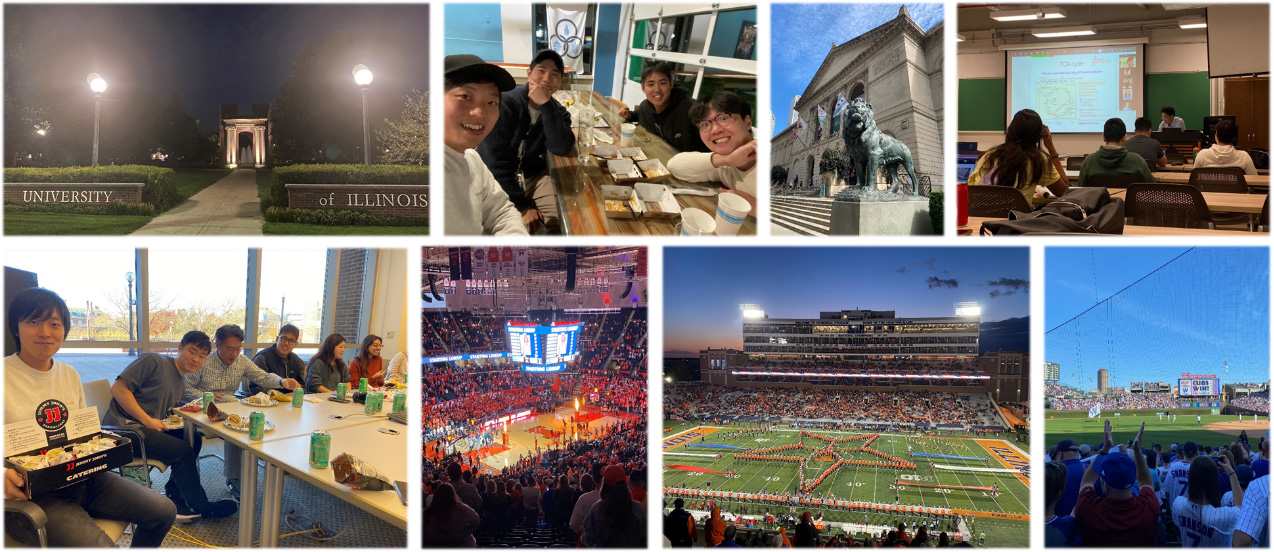三吉 健太
●滞在先:イリノイ大学アーバナシャンペーン校 (The University of Illinois at Urbana - Champaign, UIUC), Illinois USA
●渡航期間:2023年9月16日~2023年11月15日
What I learned during preparation for internship
“Start action ASAP.”
It took 9 months from the first contact with the host faculty to the implementation of the program.
Housing
The student dormitory was fully booked 3 months in advance.
→ Replaced by Airbnb. Checking “CRIME MAP” is important and useful.
Document
It can take 2 weeks to exchange E-mail and document with overseas for one round trip.
→ Sometimes they forget about it, so you need to prompt them.
Visa inspection
The J-1 visa interview appointments are very busy.
→ If you recheck frequently, the latest date might be open. The earliest appointment can be on phone call.
Purpose of internship and results
“Learn about non-conventional yeast culture techniques and food-related research.”
Experiment
I learned yeast culture and medium analysis methods with lab members.
Meeting
Careful progress management and attentive guidance for students
→ Progress report and journal club for one student every week
→ Project MTG with external parties once every two weeks, MTG with PI before that
→ Personal meetings available as needed
Lectures & Scientific talks
Attended PI lectures and learned about the basics of Synthetic Biology and trends in the U.S.
“Interacting with local people and cultivating an international mindset.”
Lab members
We talked about researches, home countries, and sightseeing spots at lunchtimes and home parties.
→ I got to know some of the students and was able to talk with them comfortably.
Others
I participated in events in my own department and interacted with people outside the laboratory.
→ There were many Asians in the host lab, and I also had opportunities to communicate with Westerners.
What I learned about communication
“Listening and vocabulary are the key. But the most important thing is passion.”
Listening
Asian and second language speakers' English is relatively OK; Westerners and native speakers' is tough.
→ If you listen back to them, they’ll slowly speak in a different words and you’ll be able to make sense.
Vocabulary
Grammar may be messed up, but it's understandable. “Degawa (Japanese comedian) English” works well.
→ We should memorize simple verbs, many nouns, and the necessary proper nouns preferentially.
Passion
They were more tolerant of people unfamiliar with the culture than in Japan.
→ It is important to speak up about what you don't understand. You can use body language as well.
Growth points and unachieved challenges
“English skills for survival”
Documents
Documentation skill of various intensities in English (emails, chats, reports, etc.).
Talks
Self-initiated conversations and simple research-related discussions were relatively well done.
→ Conversations with multiple people and listening to first meeting people need to be improved.
“Time constraints and International situation limited some planned activities.”
Experiments
Experiments conducted in two months were limited to yeast culture and medium analysis.
→ Time constraints and division of roles. I could see and hear others’ through lectures and discussions.
Urban Tourism
I went to Chicago only once and felt a different atmosphere than campus towns.
→ I would like to go more, but the unstable international situation prevented me from doing so.
Experience from working in different fields
“The difference that makes the difference.”
Strains
Difficulty in handling yeast and other slow-growing strains.
→ Aseptic manipulation. Long-term experiments. Some people conducted multiple experiments at once.
Project management
Thorough division of roles within the project.
→ Strain construction, Culturing, Analysis, etc. There is also a dedicated manager.
Other important lessons
“How to establish a daily life foundation in an unfamiliar place.”
Good foods and safety places are keys to stay healthy both mentally and physically in a foreign country.
→This experience can be helpful for my future activities and care for international colleagues.
Daily life

Thank you for this valuable experience with Dr. Jin and his kind students!!
Research
Background & Objective
Bioprocesses are expected as a sustainable material production processes because they use renewable biomass resources as raw materials. However, the high cost has hindered their practical application. One of the factors increasing the cost of bioprocesses is the cost of neutralizing the culture medium to prevent the microorganisms from dying. Therefore, the use of Issatchenkia orientalis, which can grow even at low pH, as a host has been tested to establish a low-cost bioprocess that does not require neutralization. In this internship, I participated in a research project that aims to reduce carbon loss of I. orientalis by introducing it an artificial metabolic pathway that suppresses CO2 emissions. My role was to evaluate the culture of genetically modified I. orientalis strains and to elucidate the mechanism.
Result
Genetically modified I. orientalis strains were constructed by our collaborators. These strains were introduced an artificial metabolic pathway that suppresses CO2 emissions and a metabolic pathway that uptakes xylose, the second most abundant sugar in nature. As my own efforts, I cultured these genetically modified strains under different sugar sources and oxygen conditions, and evaluated their growth rate and organic acids production. Compared to the wild-type strain, the growth rate and organic acids production of the genetically modified strain decreased when glucose, a standard sugar source, was used. On the other hand, the growth rate did not change and ethanol production among organic acids decreased when xylose was used as the sugar source. In both cases, the introduction of artificial metabolic pathways may have contributed in some way to the phenotypic changes, indicating the need for further analysis.
Future plans
To elucidate the mechanism that caused the phenotypic change, we consider to continue this research after the internship. We aim to gain insight into the metabolic modifications necessary for the establishment of bioprocesses using I. orientalis, by measuring the metabolic flux in this cell under different pH conditions and with and without artificial metabolic pathways.








